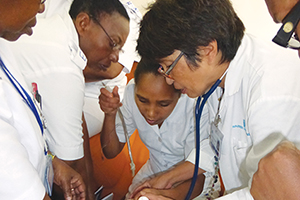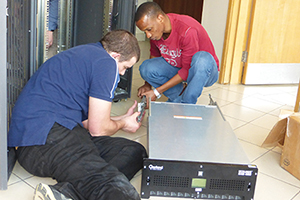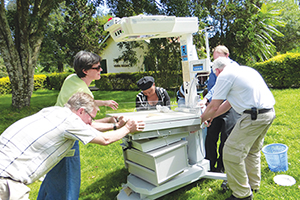By JULIE MINDA
System provides ongoing clinical training, technical support, supplies to facilities
At the end of a medical mission to Arusha, Tanzania, SCL Health clinician volunteers were in the chapel of Arusha Lutheran Medical Centre, preparing to depart for the U.S., when three Tanzanian nurses ran in, asking, "Do you have time to teach us how to do CPR before you leave? We work in intensive care, and we didn't learn how to do it in our classes here." The volunteers taught the nurses the technique on the spot.

Dr. Pat Sato, right, demonstrates how to maintain an airway in an intubated patient, during a “skills fair” SCL Health missionaries held in Tanzania for intensive care unit nurses from Arusha Lutheran Medical Centre. Sato is a semi-retired pulmonologist and critical care physician practicing in the Denver area.
The lack of that level of basic training for intensive care nurses at the northeast Tanzanian medical facility illustrates one of the many gaps that exists in the health care system in this sub-Saharan African nation. According to Dr. Mark Jacobson, the executive director of Arusha Lutheran, fewer than half of the medical personnel that are needed are in place in Tanzania; and, in addition to the shortage of properly trained clinicians, there is a severe lack of medical equipment and supplies.
Broomfield, Colo.-based SCL Health has been working for more than a decade to help Arusha Lutheran and its affiliated facilities advance and modernize its medical care, and it has been doing so in ways that make those advances sustainable.
"It is better to teach someone to fish than to just provide them with some fish," said Carlos Sarmiento, one of a group of SCL Health IT staff who installed an information network at the Arusha hospital in May and trained the Tanzanian hospital IT staff who will support and maintain it.
Sr. Jennifer Gordon, SCL, system director of mission services for SCL Health, explained that while many U.S. health care providers sponsor mission trips that are aimed at doing as many surgeries or procedures as possible during their time in country, SCL Health opted for a different approach. "We're trying to change the infrastructure by training physicians and nurses and by getting our Tanzanian colleagues trained on the equipment we donate to them" in addition to performing surgeries on a limited basis.
Long-term relationship
The vast majority of SCL Health's mission work in Tanzania supports Lutheran church ministries established or improved by Jacobson during his 30 years working as an expat American and Lutheran missionary in Arusha. Jacobson said he "felt an overwhelming sense of having arrived where God wanted me to be" while traveling in Tanzania during summer break and vacation time while in medical school and training in the U.S. After his graduation, Jacobson accepted a medical mission post in Arusha in October 1985 to improve the quality of a small Lutheran clinic system centered there. Over the course of his career, Jacobson, now 63, was the central figure in developing one of the clinics into the Selian Lutheran Hospital — a free charity hospital — in the late 1980s, in building its sister hospital Arusha Lutheran in 2004, and in establishing the Arusha Lutheran Medical Centre School of Nursing in 2014.

Zach Rooney, left, an information technology staffer with SCL Health’s St. Vincent Healthcare of Billings, Mont., teams with a member of Arusha Lutheran Medical Centre’s information technology staff to install data storage equipment.
SCL Health's partnership with the facilities began in earnest in 2004, through the system's Saint Joseph Hospital. Leaders of the Catholic hospital wanted to establish long-term aid work in a developing nation. Sr. Gordon said they honed in on Arusha because several of Saint Joseph's physicians had been going on traditional medical missions hosted by the community's Lutheran health facilities; there were significant unmet health care needs in Tanzania; the country was stable enough to maintain infrastructure changes that SCL Health hoped to support; and with English the business language in Tanzania, there was the potential for easier communications.
Jacobson and his colleagues at Arusha Lutheran identified gaps in personnel skills and information technology and other infrastructure, as well as equipment, supplies and medications the facility needed. SCL Health proved a loyal partner. Over the years it has sent clinical trainers and technicians to teach Tanzanians how to operate and maintain equipment, along with cash and containers full of medical equipment, IT equipment, bandages, syringes and other donated items. (On rare occasion, doctors from Arusha have come to Saint Joseph to learn procedures.) SCL Health has sponsored a dozen mission trips to Arusha since 2004.
Skill building
In Tanzania, SCL Health clinicians have trained their peers to perform laparoscopic procedures, and they've trained practicing nurses and nursing supervisors in intensive care unit and neonatal intensive care unit care.
SCL Health missionaries have installed biomedical equipment and helped establish physical therapy and rehabilitation services at Arusha Lutheran and on a limited basis at Selian Lutheran.
The most recent trips — including the latest in May — have centered on training nurses in the nascent nursing school, particularly in basic medical skills. The volunteers also have been educating practicing nurses on the complex care of infants on ventilators in the neonatal intensive care unit at Arusha Lutheran, the region's only NICU.
Currently, there are 45 students at the Arusha nursing school, which provides training similar to registered nurse training in the U.S. The plan is for the campus to eventually accommodate 96 full-time nursing students to generate staff for Arusha Lutheran, Selian Lutheran and other Tanzanian medical facilities. Sr. Gordon said this nurse training initiative is critical. Tanzania is experiencing a mature AIDS epidemic that is straining the already-limited health care workforce. And the country has only 2.4 trained nurses and midwives per 10,000 people — this compares to 98 per 10,000 in the U.S.
Currently, the nursing school is operating out of temporary quarters at a space that formerly housed a tropical pesticides research institute. SCL Health is helping the school apply for grant funding for a permanent campus.
A jewel
SCL Health information technology staff volunteering on the May medical mission, upgraded Arusha Lutheran's IT network, installing new servers with expanded storage, and adding wireless connectivity to new desktop computing stations. The IT team also trained the hospital's IT staff on the new system. Sarmiento, director of data center operations for SCL Health, said once a data storage unit they installed is operational, the system will give clinicians the ability to store and access more information on patients.

In Arusha, SCL Health medical missionaries and a representative of Selian Lutheran Hospital’s hospice program, at center, urge a donated baby warmer across soggy grass in preparation for the equipment’s transport to Arusha’s Selian Lutheran Hospital.
Biomedical technology experts on the May mission installed and trained the hospital's biomedical staff on the use and maintenance of anesthesia machines, endoscopic equipment and operating room tables. The group set up a medical air compressor and manifold system used to provide oxygen therapy for babies, according to Dan Ritter, trip participant and Saint Joseph Hospital director of clinical engineering. He said much of the equipment is from Saint Joseph Hospital, which has moved into a new campus and replaced much of its equipment.
Retired Saint Joseph surgeon and 22-time medical missionary Dr. Joel Sigdestad volunteered in Arusha prior to the official 2004 start of the SCL Health-Arusha system relationship, and he has seen the evolution of health services in the community. He said in part because of the training, equipment and support SCL Health has provided, Arusha Lutheran "has grown to be a jewel for Tanzania."
Bearing fruit
Sigdestad said it has been "tremendous" for him to return year after year and witness the positive changes that have come about — increasing numbers of trained staff, more advanced medical equipment, a blossoming nursing school and, most significantly, a healthier Arusha community as a result of the increased health care access.
Jacobson said the longevity of the relationship, and the shared commitment to faith-based values has made the partners' work successful. "It's a true relationship of friends. We relate to and listen to each other."
| Poverty still widespread in Tanzania, despite some economic improvement In recent years, economic indicators have been improving somewhat in Tanzania, but the country is still one of the poorest in the world when it comes to per capita income. That is according to information from the World Bank and the Central Intelligence Agency's World Factbook. The Factbook says Tanzania's gross domestic product has been growing owing to its wealth of natural resources and tourism. That resource says that the incidence of poverty in the country is declining. However, about 40 percent of Tanzanian adults earn less than $1.25 per day; and the average per capita income is $948 annually. The World Bank also says Tanzania has been making uneven progress in achieving the Millennium Development Goals associated with the United Nations Development Program's Human Development Index. According to a 2014 progress report on the United Nations program's website, Tanzania was not on track to meet its goals on reducing the proportion of the population below a basic needs poverty line; reducing the percentage of children under age 5 with stunted height; improving the ratio of women to men in university, college and other venues of tertiary education; improving maternal mortality rates and improving the proportion of births attended by skilled health care workers. However, Tanzania had made progress on, or had achieved its goals for, many other indicators associated with the Millennium Development Goals, including reducing the mortality rate for children under age 5, improving the proportion of children vaccinated against measles and reducing HIV prevalence. There are seven Millennium Development Goals, with several indicators associated with each goal. The seven overarching goals are to: - Eradicate extreme poverty and hunger
- Achieve universal primary education
- Promote gender equality and empower women
- Reduce child mortality
- Improve maternal health
- Combat HIV/AIDS, malaria and other diseases
- Ensure environmental sustainability
|
Copyright © 2015 by the Catholic Health Association
of the United States
For reprint permission, contact Betty Crosby or call (314) 253-3477.